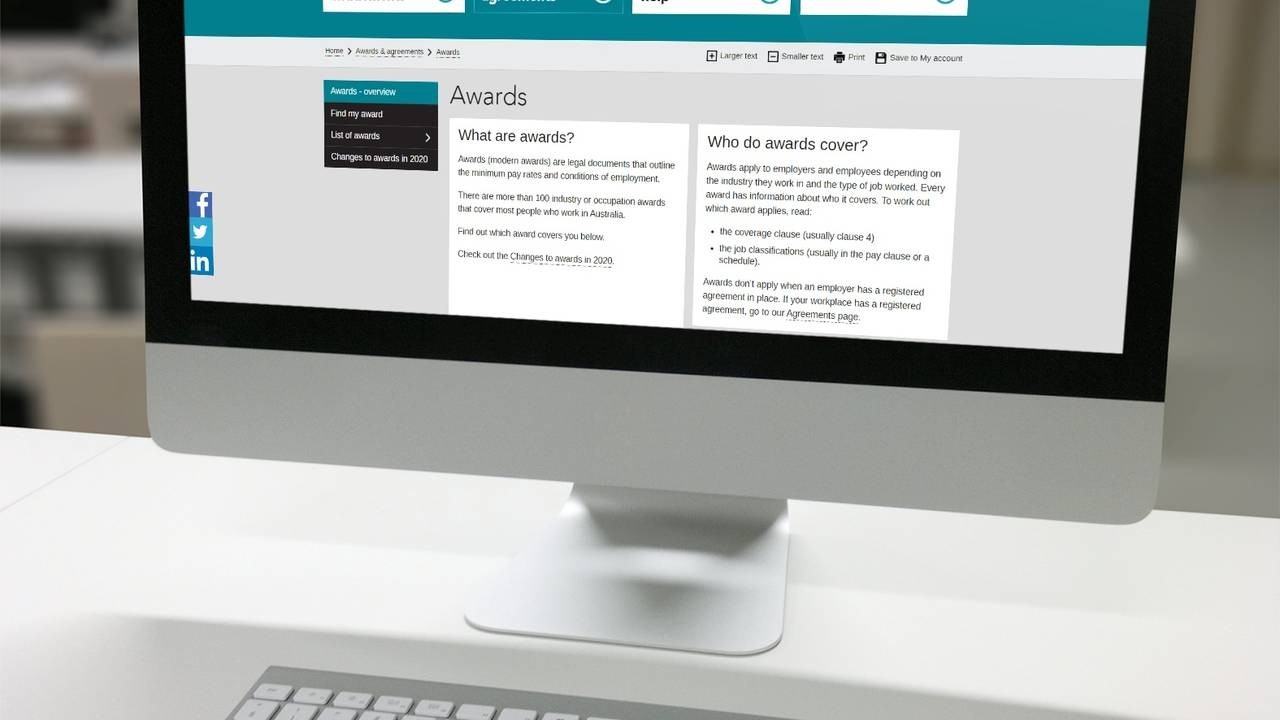The Latest from Kristy-Lee
3 Reasons You Might be Frustrated with Your Employees

One of the most common, and annoying, challenges we face as business owners is when we have a staff member who is frustrating us! Sound familiar?
It takes up headspace, energy, time, and ultimately distracts us from focusing on more positive actions and activities in our business.
Often we can clearly identify why we are so frustrated, but sometimes it more subtle, and even hard to put your finger on, and these are the trickier situations to manage. When we are clear on why we are frustrated, we can talk to the employee, articulate the problem, state what needs to change and work on a path forward. Whereas when the issue is more subtle and difficult to identify, it’s hard to know what to do. What ends up happening is the frustration builds, and often we lose sight of what we originally were reacting to, and everything starts to frustrate us when it comes to that team member.
Fundamentally, when we are frustrated with one of our team, it’s because they aren’t meeting our exp...
Motivating Disengaged Employees

How frustrating is it when you have someone on your team who you know has so much potential, is actually really great at their job and everyone really likes them - but it’s like they are just going through the motions? They get the job done, but only just, they certainly don’t show initiative and you just want to shake them because you know they are capable of so much more, of doing a much better job.
You know they are smart, capable, skilled and you’re frustrated that you’re not seeing their best.
Here's what you’re dealing with when it comes to these people – it’s not that they are lazy – they simply lack motivation.
Why is that your problem you ask? Well, you know how hard it is to find great staff right? So, you don’t want to exit them and have to go through the recruitment process again. Add to that the fact that by proactively working to improve motivation you are actually improving employee engagement – and that can result in a bottom like increase in profits of more...
The Hidden Benefits of Investing In Training and Development

The Hidden Benefits of Investing In Training and Development
Henry Ford famously said “the only thing worse than training your employees and having them leave is not training them and having them stay”. But the reality is, many businesses are currently falling short when it comes to their investment in training, developing and upskilling their people.
For small businesses in particularly, training can seem like just another cost, another thing they need to find budget for, so it’s unsurprising that unless there is an urgent need to provide training in order for operations to continue, it often gets over looked or pushed to the bottom of the pile.
Here’s the thing though, when we reframe training, upskilling, knowledge acquisition and staff development into an investment in our business, rather than a cost of having employees, it can really switch our perspective. Do you invest in other things to support your business and it’s growth? Software, equipment, advice? Of course you do, so...
Compliance Essentials That Could Save You Thousands

Keeping up with compliance obligations is one of the key pain points employers face, especially when there is such frequent change as we’ve seen with the recent review of Modern Awards, changes to casual definitions, introduction of annualised wage agreements into more Awards, the constant analysis of Contractors v’s Employees and consistent Superannuation increases. It’s no wonder it feels overwhelming for employers, especially small businesses who don’t have in house HR expertise keeping abreast of the changing industrial relations landscape for them.
So, I guess it comes as no surprise that many business owners stick their head in the sand when it comes to HR compliance, and hope that they manage to get by, flying under the radar from attention from the Fair Work Commission.
But sticking your head in the sand is literally the worst thing you can do, in fact doing that could cost you dearly. With infringement notices starting at up to $ 1 332 per individual and up to $6 660 f...
You Are Encouraging The Behaviours You Tolerate

We all know the feeling, we’re losing sleep, we’re avoiding the person at work, we’re angry, frustrated and tearing our hair out. We have an employee who is not performing, or not showing up how we want them to at work.
We can’t always quite put our finger on the exact issue, it’s just not quite right, but it’s wrong enough to be consuming our time and attention. Or maybe it is more obvious, but we feel like we’re going over the top if we bring it up – we don’t want them to feel like we are micromanaging them or pulling them up for something that feels petty and insignificant (yet the fact that it’s consuming our time and attention does in fact mean that at some level it is significant to us).
So, we tolerate it, whether it’s behaviour, attendance, performance or something else, we tolerate it. We think maybe it’s not that much of a big deal, or maybe it’ll be short term, or surely they will realise soon and fix it!
Here’s the thing – your employees won’t suddenly realise t...
Why 46% of New Hires Fail

Did you know that up to 46% of new hires ‘fail’? That’s right – almost half of employees who start a role with a new employer don’t make it through 18 months (Leadership IQ).
Whilst it’s easy to conclude that obviously the applicant has misled us, lied in an interview, is not able to do what they promised or for some other reason the fault lies with them, is that really the case?
There is no doubt that making great hiring decisions is essential to creating the best possible team for your business, a team that is motivated, capable, productive and high functioning, but when we get the hiring decisions wrong, we are so often quick to look to others as the reason for this.
In an era where we are ‘panic hiring’ due to the lack of applicants in the market, a situation which is not likely to change in the short term, hiring the best person for the role can feel difficult, or even impossible, but it’s also why it’s so important to pay attention to the decisions we are making right...
Create Clarity by Starting with a Clean Slate

As we grow our teams and our businesses develop, flex and change, we come to realise that what got us where we are, won’t necessarily get us to where we want to go. Sometimes this is true for some of our team as well. It’s completely normal, we fill gaps as we see them, but often without strategically considering how this fits with the future vision of the business.
In time we can feel overwhelmed and like we are spending our days managing people, which is the opposite of what we wanted to do when hiring a team.
At these times of growth, overwhelm and change gaining clarity is critical to being able to move forward and get to where want to be faster and more efficiently.
This is just one of the reasons I really believe in the value of a clean slate, and the clarity this can bring to understanding what you need in your team and how you can go about creating this mix, and potentially making positive change in your business.
Having a solid organisational structure is criti...
Why Curiosity is Your Secret Super Power

Were you like me, and one of those kids who would ask ‘why?’ all… the… time?
My parents must have lost count of the number of times I said ‘but why’ and kept asking and asking and asking until I had a satisfactory answer, and I quite often didn’t.
As young ones we are naturally curious, some more than others, but we all have a natural curiosity, and it seems that as we grow older, wiser, more experienced, we stop leaning into that curiosity. We become quicker to make assumptions, to assume we know the answer, to make educated guesses. That serves us well some of the time, but a lack of curiosity can also have its downside – we miss things, we miss the truth, we make false assumptions, and we make decisions based off half-baked information.
I first witnessed this fading in true curiosity when completing a major research paper for my university studies, when I was studying criminology and forensic psychology. We were looking at the perception of crime in children, and specifi...
How to Attract Applicants in a Tough Market

Are you hiring right now, or have you tried to hire in the last few months? If you have, it’s likely that you’ve found it pretty tough! Perhaps usually you are inundated with applicants and right now it’s crickets… not even bad applications are coming through.
We are certainly seeing this trend across the board, from every corner of the Country and in every industry.
Business owners and managers alike are frustrated, desperate for help and uncertain how they can continue without more staff. Many are turning away work, re considering their business viability and increasingly working insane hours which will undoubtedly lead to burnout.
So, what’s the answer? Is there a way to actually find anyone right now?
Here’s the thing – what worked before simply won’t work now. Writing an average ad, throwing it on Seek and sharing it on your socials just won’t cut it. You not only won’t get quality applicants, you may very well get absolutely no applicants.
Right now, applicant...
Should You Sack Them or Save Them?

Should You Sack Them or Save Them?
Ever found yourself asking this question?
You have someone on your team who isn’t where you want them to be, but you’re torn. On one hand you really want to make it work, and continue doing more to turn them around. You know how difficult it is to find great staff, and recruitment is time consuming and costly. You want to avoid having to start a hiring process, but is it even possible to turn this person around, no matter how much you like them?
On the other hand, despite feeling like you can’t make it work, you don’t want to fire them! That requires confrontation, and what if you get it wrong? An Unfair Dismissal Claim doesn’t sound like a whole lot of fun.
You end up going around in circles asking yourself whether you should sack them or save them.
So, what’s the answer? How do you really know whether, with a little effort, this person might be your next super star, or whether you are wasting your time and theirs, because there i...

